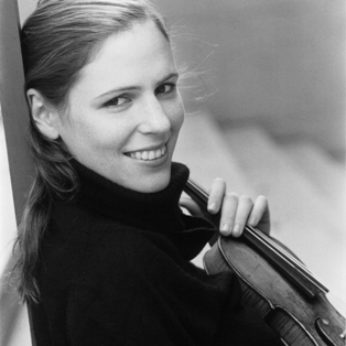Composer: Valentin Silvestrov (b. 1937)
Performance date: 01/07/2014
Venue: Bantry Library
Composition Year: 1991
Duration: 00:16:02
Recording Engineer: Richard McCullough, RTE
Instrumentation Category:Duo
Artists:
Cédric Pescia -
[piano]
Nurit Stark -
[violin]

Valentin Silvestrov was born in
He, Sofia Gubaidulina and Giya Kancheli are the most important living composers
from the old Soviet republics, but his music is scarcely known in the West.
Like Arvo Pärt, his early avant-garde style underwent a radical change and he
developed a new language exemplified in his extraordinary song cycle Silent Songs. At this time of his life
in the seventies, he had been banned from the association of Russian composers
for protesting at the stifling cultural bureaucracy. Like Schnittke and
Gubaidulina, it was made almost impossible for him to earn a living as a
composer and he was effectively isolated and surrounded by a ring of silence –
thus the Silent Songs. Despite the
horror of events in his homeland,
being just one, Silvestrov remained in
In his later music Silvestrov targets his
listeners’ memory. The world is dimly
discernible behind musico-physical forms, behind intonations and genres.
Composer and listeners need the unique, indestructible moments that have been
awaited for an eternity and for the sake of which one can fall in love with a
new work, just as one could at the time of Mozart, Schubert and Chopin;
moments, in short, whose absence betokens the end of the work’s existence. Once
these moments have been captured by the mind’s ear, I try to transmit them,
like rays of light, into the relative darkness of the work’s musical structure
(a structure that is still unclear to me myself), irrespective of the manner in
which I am currently working.
Post
scriptum was written in 1990-1 in celebration of
the Mozart bicentenary. Silvestrov describes it as a postscript to Mozart and, more generally, to Classicism. The text is
already written, we supplement it with our own remarks, ideas and questions,
with our bewilderment, astonishment and regret. The work opens in silence –
Using a flexible up-bow stroke, play a
soundless forte so that real music emerges from this imaginary music. The real music opens with an imaginary
miniature Mozartean sonata subject that is, if you like, our memory of
perfection, heard somewhere and now gradually fading. We hear a ghost of a
classical past, part memory, part imaginary, but the outlines of traditional
forms are gradually lost from sight. Silvestrov’s beloved songlike shapes open
the second movement, which appears without a break, but when we reach the
finale, even this fades away. The music dematerialises, the thematic ideas
stagnate, trembling like a pulse that has finally stopped beating. Instead of a classical sonata, what we see
before us is its beautiful ruins. The underlying tragedy lies in its bizarre
contrast with the bright-toned, wholly undramatic nature of the composition, a
tonal quality maintained to the very end of the piece.
Copyright © 2024 West Cork Music. All rights reserved.
Designed and developed by Matrix Internet